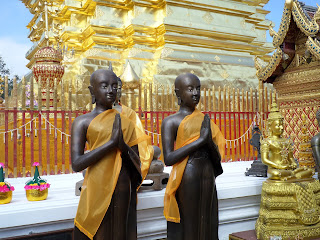नारायणं नमस्कृत्य नरं चैव नरोत्तमम्
देवीं सरस्वतीं चैव ततो जयम् उदीरयेत्
महाभारत
Mahābhārata
As retold by
Michael Dolan, B.V. Mahāyogi
Bhagavad-gītā
Summary part two:
What is Renunciation?
Now, Krishna has really explained everything quiet simply. And yet, Arjuna is still not satisfied. He doesn’t understand the difference between karma, meditation, and yoga.
If self-realization is so important, then why should he fight at all?
Wouldn’t it be better for him to renounce everything and go off into the forest as a yogi? What has violence to do with self-realization?
What he doesn’t understand is that while Krishna’s message is universal its application may differ according to one’s ability or level of consciousness.
Society may be divided into different classes of men and women according to their qualification. Some men and women qualify as intellectuals and professionals, others as leaders and organizers. Some people are best as entrepreneurs and businessmen.
And then, there are those who function well in the service industry or in production in the manufacture of goods. These social divisions are also referred to in the Bhagavad-Gita.
One’s path of self-realization may be qualified by his position within society. While we are all equal in spirit, as a practical matter we have different capacities for self-realization.
Generally speaking, it isn’t good advice to tell a family man with many responsibilities to give up his material life and walk the path of renunciation.
Not everyone has the same vocation for spiritual practice.
The universal message of sacrifice and dedication must be fine tuned for the individual according to his personal level of consciousness as well as his place in society.
And so, Krishna says, it is not fit for Arjuna to renounce the world. Renunciation in yoga practice is not for everyone. What is best for Arjuna, Krishna says, is to do his duty as a warrior.
Each of us has our own pathway to truth; it is not proper for us to give up the path which is suited for us for another more dangerous path. One who follows another’s path is destined for ruin.
The yoga of renunciation is improper for Arjuna, since his work, his karma, and his duty, his Dharma, is of a more passionate nature. After all he is a warrior both by birth and training.
Those of the more gentle and intellectual nature, the brahmanas and sages, wandering Saints and mystic yogis of the Vedic age can take the path of renunciation. They are more given to self abnegation by nature.
Gentle and saintly souls can lead a life of quiet contemplation; Arjuna is better suited for combat and competition. His heart yearns for contests at arms. He is not suited for the contemplative life of a mystic yogi. But he can reach the same goal through self-dedication by karma yoga.
Krishna explains that it is not action itself that must be renounced, but attachment to its results. It is better to sacrifice the results of our work to a higher power. One must understand that both work and its results are temporary. And so real sannyasa or renunciation consists in giving up our attachment to the results of work.
One must strive for perfection, sacrificing the results of our work to a higher power. Krishna says that one who neither hates nor desires the fruits of his activities is known to be always renounced. Such a person, free from all dualities, easily overcomes material bondage and is completely liberated.
At the beginning of the sixth chapter, this is re-iterated by Krishna as follows:
At the beginning of the sixth chapter, this is re-iterated by Krishna as follows:
TEXT 1
sri-bhagavan uvaca
anasritah karma-phalam
karyam karma karoti yah
sa sannyasi ca yogi ca
na niragnir na cakriyah
anasritah karma-phalam
karyam karma karoti yah
sa sannyasi ca yogi ca
na niragnir na cakriyah
SYNONYMS
śrī bhagavān uvāca—the Lord said; anāśritaḥ—without shelter; karma-phalam—the result of work; kāryam—obligatory; karma—work; karoti—performs; yaḥ—one who; saḥ—he; sannyāsī—in the renounced order; ca—also; yogī—mystic; ca—also; na—not; nir—without; agniḥ—fire; na—nor; ca—also; akriyaḥ—without duty.
TRANSLATION
The Blessed Lord said: One who is unattached to the fruits of his work and who works as he is obligated is in the renounced order of life, and he is the true mystic: not he who lights no fire and performs no work.













No comments:
Post a Comment
Note: Only a member of this blog may post a comment.